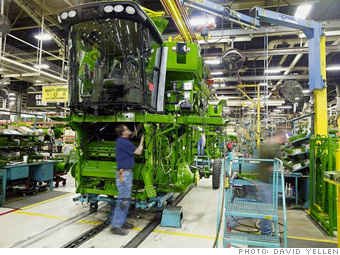
Farm equipment maker Deere has tried to avoid inventory buildups because of uncertain demand.
A widespread criticism of the Wall Street firms that stumbled or fell in the financial crisis is that their pay programs encouraged too much risk; executives had much to gain if their high-risk bets paid off and little to lose if they didn't. In fact, Washington's $700 billion rescue package specifically requires that incentive compensation at the affected firms must not "encourage unnecessary and excessive risks that threaten the value of the financial institution."
While you're making sure that pay arrangements at your company don't encourage too much (or too little) risk, think more broadly about what they encourage. At Deere, for example, incentives are based on economic profit, a measure that includes capital costs, and bonuses earned in any given year are paid out over four years; if performance falters, part of the bonuses can be canceled. The system encourages long-term thinking and seeing the recession as part of a larger cycle.
Last updated January 08 2009: 9:17 AM ET
